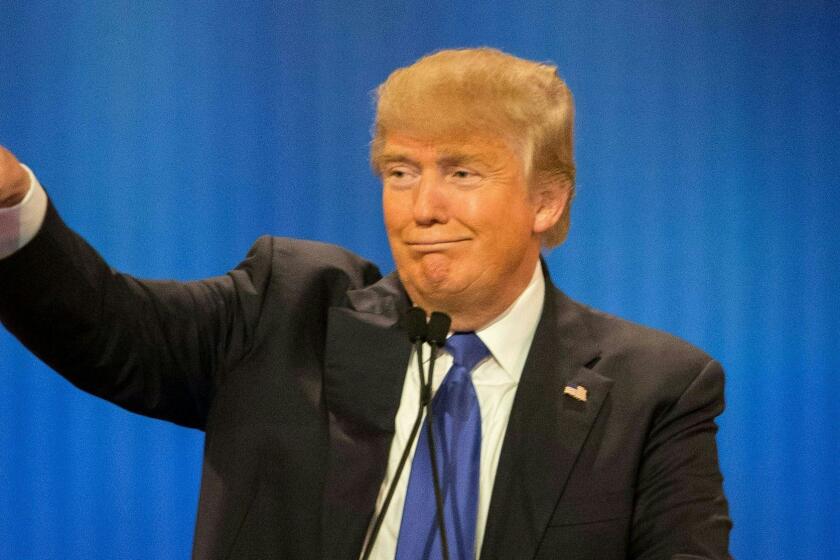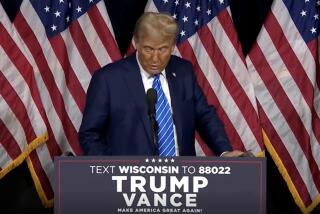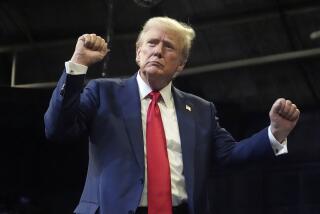Trump’s dangerous Sunday drive-by recalls the madness of a monarch. But he’s not one

- Share via
“I cannot inquire after His Majesty’s symptoms until he chooses to inform me of them.”
This weekend, as President Trump’s mendacious doctors had the press scrambling with timelines, oxygen levels and the significance of certain drugs prescribed during his treatment for COVID-19, all I could think of was the scrutiny of the royal stool and urine in “The Madness of King George.”
So I decided it was time to re-watch the award-winning 1994 film, adapted by Alan Bennett from his award-winning 1991 play, “The Madness of George III.”
And you know what? The parallels are highly disturbing.
Not just because the above quote — from the king’s “doctor” in answer to questions about George III’s conspicuously erratic behavior — is not too far off from Dr. Sean Conley’s reports on the president’s condition. On Saturday, Conley admitted to lying about the president’s condition to reflect his patient’s “upbeat attitude” and because he “didn’t want to give any information that might steer the course of the illness in another direction.”
The notion that COVID-19 takes its cues from the news is about as scientific as the “blistering” treatment royal doctors recommended for George.
The Trump presidency has thrown the nation into a narrative crisis. How can we make sense of a political story that drops new bombshells daily?
Much of “The Madness of King George” deals with the difficulty of attempting to treat a ruler who is incapable of recognizing reality and his own relationship to same, a ruler known to punish ruthlessly those who dare presume even to look at him, much less attempt to advise or to heal him.
Which sounds a tiny bit familiar; Mark Meadows reportedly faced the president’s wrath after he informed reporters that Trump was not sailing along as blithely as Conley had indicated.
But the most disturbing parallel came just as I finished watching the film’s climactic scene. The king — realizing that his son is about to have himself named regent — pulls it together enough to get in a carriage and appear before the cheering throngs, and I glanced at social media to find that President Trump was in the process of doing the very same thing.
For reasons known only to themselves and whatever gods they worship, doctors at Walter Reed allowed a man with full-blown COVID-19 to get into an SUV filled with the requisite sacrificial victims — er, Secret Service agents — so he could wave to his supporters (many of them maskless, few of them social-distancing) as they clamored to wish him well in fighting this highly infectious and deadly disease.
Honestly, all that was missing was the gilded royal carriage.
This prophetic juxtaposition between art and life left me freaked out in a way I hadn’t been since, well, Friday. Which is when we learned that the Rose Garden ceremony to announce Trump’s nomination of Amy Coney Barrett to the Supreme Court, held a mere week after the passing of Supreme Court Justice Ruth Bader Ginsburg, had been a COVID-19 super-spreader event.
I may be a recovering Roman Catholic, but the “And then God said: ‘Nope’” overtones of that situation seem pretty darn clear.
In 1976, the United States’ bicentennial year, my little brothers and I woke up on the Fourth of July in a spirit of patriotic fervor so overflowing that we felt compelled to share it with the neighborhood.
To see a president rewarding supporters, in his own special way, for doing the same sort of things that put him in the hospital in the first place?
Who’s the mad king now?
Actually, the comparison isn’t fair. George III, now perhaps best known for providing the comic relief in “Hamilton,” had apparently returned to a state of wellness by the time he presented himself to his loyalists. Also — and this is important — he was at no point encouraging his subjects to make themselves vulnerable to the highly infectious disease from which he himself was suffering.
(And before you hit me with “But what about the risks involved in the Black Lives Matter protests?” Please. People take to the streets to protest only when other means of achieving justice have failed; that millions did so in the middle of a pandemic is simply a gauge of how complete and devastating those failures have been.)
I understand the desire of Trump supporters to show up for the ailing president, just as I understand the president wanting to thank them, as he said in a video he tweeted to tease his little journey. (Had he been feeling better, he could have just sung the “Hamilton” King George bit about “for your love, for your praise and I’ll love you ‘til my dying days...” which honestly would have been super fun).
But God Almighty, you would think he might have urged the people he claims to love so much to take steps to ensure their own safety. None of those folks are going to get airlifted to Walter Reed if they test positive and turn feverish. None of them are going to get all the COVID-19 drugs and treatments available in a 48-hour (or however long it has actually been) span.
If Trump suddenly felt that Twitter was no longer the best way to engage with his supporters, couldn’t he have just waved from the window like Ronald Reagan did? As far as I know, Vice President Mike Pence was not scheming to have the 25th Amendment invoked (although given the insanity of this particular Sunday drive, maybe he should).
Late in 1788, in the 28th year of the reign of England’s King George III, something extraordinary happened: As one modern historian’s tactfully puts it, “The king’s mind broke down.”
No matter what Trump may think, this is not a monarchy. The president is not anointed by God to rule. He is elected to serve the American people with the understanding that if, for whatever reason, he is incapable of serving, the vice president will step in. That is why we have a vice president!
The demand for an accurate account of the state of Trump’s health is not about the man; it’s about the presidency. If nothing else, he should respect the office enough to put all his effort into getting well, not taking a smile ‘n wave lap.
One hopes that the president is indeed on the mend — because there are still a hell of a lot of questions he needs to answer. Questions about his taxes and outstanding loans, about continued Russian interference with the election and about accusations against Kimberly Guilfoyle.
Not to mention the timeline of his diagnosis and his lack of basic social precautions.
Like whatever afflicted King George III, who continued to suffer from bouts of “madness,” COVID-19 is a tenacious disease; even on the way to health, there is a pretty good chance that Trump will continue to be affected by symptoms. Suffering from this disease can be debilitating and terrifying, which is why the Biden campaign suspended its negative ads and the press has put aside the many issues facing the Trump campaign in favor of a minute-by-minute focus on the president’s condition.
Still, it’s hard to see his heedless Sunday drive as anything but permission for the many questions and criticisms raised about his financial situation, his handling of the pandemic and the scandals affecting so many of his inner circle to resume.
As my mother used to say, if you’re well enough to go out and play, you’re well enough to go back to school. Though in this case, please do it remotely.
More to Read
The biggest entertainment stories
Get our big stories about Hollywood, film, television, music, arts, culture and more right in your inbox as soon as they publish.
You may occasionally receive promotional content from the Los Angeles Times.












